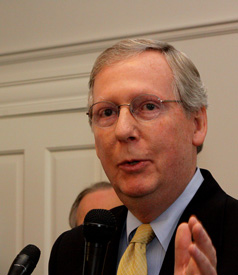Leading senators from both parties on Sunday sketched the broad outline of a compromise to extend the expiring Bush-era tax cuts for all Americans in exchange for another extension of benefits for the millions of long-term unemployed.
The outlines of compromise emerged after Republicans quashed an extension of unemployment benefits for the long-term unemployed last week and then Senate Democrats failed on Saturday to cut off debate in order to pass legislation that would extend the tax cuts for all but the top 2 percent of earners.
With each side unable to impose its will, talks involving the administration are accelerating as all sides now seek middle ground ahead of a self-imposed congressional deadline of Dec. 17.
“It’s pretty clear now that taxes are not going up on anybody in the middle of a recession,” Senate Minority Leader Mitch McConnell, R-Ky., said Sunday on NBC’s “Meet the Press,” adding that “I think we will extend unemployment insurance” and that “all of those discussions are still under way.”
McConnell also clarified that he doesn’t think there’s enough time before a congressional recess to repeal the military’s controversial “don’t ask, don’t tell” policy and allow for openly gay members of the armed services.
Appearing on the CBS show “Face the Nation,” Senate Republican whip Jon Kyl of Arizona said that compromise talks are focusing on another extension of unemployment insurance and an “extension for some period of time” of the Bush-era tax cuts. Talk is now centered on a two-year extension, perhaps three years.
Senate Democratic whip Richard Durbin of Illinois, a guest on the same show, acknowledged that any deal would be a quid pro quo.
“Without unemployment benefits being extended, this is a non-starter,” Durbin said, adding that it would be unacceptable for Congress to fail during the holidays to extend jobless benefits for 6.3 million Americans who’ve been out of work now for longer than six months.
President Barack Obama set the tone for the compromise in remarks after the failure to extend Saturday the Bush-era tax cuts for just the middle class. Failure to find compromise, he acknowledged, would mean all Americans see their taxes rise, because under current law the rates revert back to pre-2001 levels.
Click here to sign up for Truthout’s FREE daily email updates.
“We need to redouble our efforts to resolve this impasse — in the next few days — to give the American people the peace of mind that their taxes will not go up on January 1st,” Obama said. “It will require some compromise but I’m confident that we can get it done.”
Obama and top administration officials have been talking to congressional leaders from both parties. Since Tuesday, Treasury Secretary Tim Geithner and budget chief Jacob Lew have met with lawmakers at a Capitol Hill office.
The president on Saturday signed legislation to keep the government funded through Dec. 18. But Congress is torn over how to continue funding through the end of the fiscal year, Sept. 30, an issue being worked out by Lew while Geithner negotiates on tax issues.
Despite talk of compromise, the rising level of partisan rancor in recent days remains a possible glitch. Congressional leaders surprised many rank-and-file members by insisting on votes last week on the tax cuts.
Senior White House officials, in anonymous interviews in order to speak freely, outlined for reporters late last week some of what the administration wants thrown into the mix.
Careful not to make a linkage before Saturday’s vote, these officials outlined about $150 billion worth of tax cuts and credits that are set to expire. They include unemployment insurance and the alternative minimum tax, which threatens to hit tens of millions of upper middle-class earners if Congress doesn’t pass another fix.
A host of recovery-related tax measures are also be on the table, including tax incentives for small businesses to hire new workers, tax help for college students and tax credits for companies engaged in research and development.
The tax debate has included a number of disconnects on each side of the aisle. Republicans have insisted that extension of unemployment benefits be offset with spending cuts. Democrats are quick to note this has always been done in past recessions as temporary, emergency spending.
And while not willing to offer spending offsets themselves, Democrats are quick to allege that extending the Bush-era tax cuts for the wealthiest amounts to $700 billion in lost revenue that’s not offset. They don’t mention, however, that their proposal of extending the cuts to everyone else involves more than $3 trillion in lost revenue over a decade that also is not offset.
A bipartisan deficit-reduction commission on Wednesday wrapped up 10 months of work with a serious proposal to bring down debts and deficits. On Friday, however, it fell short of the 14 votes needed to send the plan to Congress as a blueprint.
(David Lightman of the Washington Bureau contributed.)
Join us in defending the truth before it’s too late
The future of independent journalism is uncertain, and the consequences of losing it are too grave to ignore. To ensure Truthout remains safe, strong, and free, we need to raise $41,000 in the next 5 days. Every dollar raised goes directly toward the costs of producing news you can trust.
Please give what you can — because by supporting us with a tax-deductible donation, you’re not just preserving a source of news, you’re helping to safeguard what’s left of our democracy.
